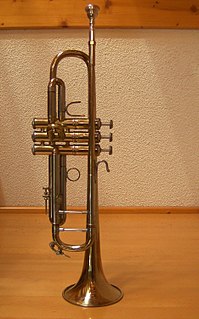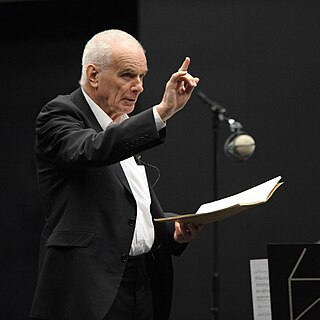Related Research Articles
David C. Sampson is an American contemporary classical composer.
Gary Kulesha is a Canadian composer, pianist, conductor, and educator. Since 1995, he has been Composer Advisor to the Toronto Symphony Orchestra. He has been Composer-in-Residence with the Kitchener-Waterloo Symphony (1988–1992) and the Canadian Opera Company (1993–1995). He was awarded the National Arts Centre Orchestra Composer Award in 2002. He currently teaches on the music faculty at the University of Toronto.

The trumpet repertoire consists of solo literature and orchestral or, more commonly, band parts written for the trumpet. Tracings its origins to 1500 BC, the trumpet is a musical instrument with the highest register in the brass family.
Graham Whettam was an English post-romantic composer.
Foreign Bodies is an orchestral composition in three movements by the Finnish composer Esa-Pekka Salonen. The work was commissioned by the Finnish Broadcasting Company and was first performed at the Schleswig-Holstein Musik Festival on August 12, 2001 by the Finnish Radio Symphony Orchestra under the conductor Jukka-Pekka Saraste.
The Cello Concerto is a composition for solo cello and orchestra by the Scottish composer James MacMillan. It is the second of three interrelated compositions in MacMillan's Easter triptych Triduum commissioned by the London Symphony Orchestra. The piece was first performed at the Barbican Centre on October 3, 1996 by the cellist Mstislav Rostropovich and the London Symphony Orchestra under the conductor Colin Davis. The work is dedicated to Mstislav Rostropovich.
The Concerto No. 3 for Piano and Orchestra "The Mysteries of Light" is the third piano concerto by the Scottish composer James MacMillan. The work was commissioned by the Minnesota Orchestra and was first performed on April 14, 2011 in Orchestra Hall, Minneapolis, by the pianist Jean-Yves Thibaudet and the Minnesota Orchestra under the conductor Osmo Vänskä.
The Boston Concerto is a concerto for orchestra by the American composer Elliott Carter. The work was commissioned by the Boston Symphony Orchestra, for which the piece is titled. It was first performed in Symphony Hall, Boston, on April 3, 2003 by the Boston Symphony Orchestra under the conductor Ingo Metzmacher. Carter dedicated the concerto to his wife Helen Jones Carter, who died on May 17, 2003.
The Cello Concerto is a composition for solo cello and orchestra by the American composer Elliott Carter. The work was commissioned by the Chicago Symphony Orchestra for the cellist Yo-Yo Ma. It was first performed in Chicago, Illinois, on September 27, 2001 by Yo-Yo Ma and the Chicago Symphony Orchestra under the conductor Daniel Barenboim.
The Asko Concerto is a concerto for chamber orchestra by the American composer Elliott Carter. The work was commissioned by the Dutch chamber group Asko Ensemble, for which the piece is titled. It was composed in January 2000 and was first performed in Concertgebouw, Amsterdam on April 26, 2000, by the Asko ensemble under the conductor Oliver Knussen. The piece is dedicated to Asko/Schönberg.
The Symphony No. 1 is a symphony for orchestra by the American composer Elliott Carter. The work was originally completed in Santa Fe, New Mexico on December 18, 1942, though Carter later revised the work in 1954. It was first performed on April 27, 1944, by the Eastman-Rochester Symphony under the direction of Howard Hanson at the fourteenth annual Festival of American Music. The piece is dedicated to Carter's wife.

The Concerto for Trumpet and Orchestra is a composition for trumpet solo and orchestra by the British composer Peter Maxwell Davies. The work was commissioned by the Philharmonia Orchestra for its then principal trumpeter John Wallace. It was given its world premiere by Wallace and the Philharmonia Orchestra under the conductor Giuseppe Sinopoli in Hiroshima on 21 September 1988.
The Symphony No. 2 is an orchestral composition by the American composer John Harbison. The work was commissioned by the San Francisco Symphony for its 75th anniversary. It was composed in 1987.
The Concerto for Cello and Orchestra is a cello concerto by the Polish composer Witold Lutosławski. The work was commissioned by the Royal Philharmonic Society with support from the Calouste Gulbenkian Foundation. It received its world premiere at the Royal Festival Hall on October 14, 1970 by the cellist Mstislav Rostropovich and the Bournemouth Symphony Orchestra under the direction of Edward Downes.
The Cello Concerto No. 1 is a composition for solo cello and orchestra by the Finnish composer Magnus Lindberg. It was first performed in the Cité de la Musique, Paris on May 6, 1999 by the cellist Anssi Karttunen and the Orchestre de Paris under the direction of Esa-Pekka Salonen.
Kraft is a composition for solo ensemble, electronics, and orchestra by the Finnish composer Magnus Lindberg. The work was commissioned by the Helsinki Festival and was first performed on September 4, 1985 by the Toimii ensemble and the Finnish Radio Symphony Orchestra under the direction of Esa-Pekka Salonen. The piece was awarded the International Rostrum of Composers in 1986 and won the Nordic Council Music Prize in 1988.
The Piano Concerto No. 1 is a composition for solo piano and orchestra by the American composer Peter Lieberson. The work was commissioned by the Boston Symphony Orchestra for its centennial. Lieberson started composing the piece in 1980 and completed it on March 2, 1983. It was written for the pianist Peter Serkin, who first performed the concerto with the Boston Symphony Orchestra under the direction of Seiji Ozawa on April 21, 1983. The piece is dedicated to Peter Serkin and Seiji Ozawa. It was a finalist for the 1984 Pulitzer Prize for Music.
The World's Ransoming is a concerto for cor anglais and orchestra by the Scottish composer James MacMillan. It was the first of three interrelated compositions in MacMillan's Easter triptych Triduum commissioned by the London Symphony Orchestra. Its world premiere was given by the soloist Christine Pendrill and the London Symphony Orchestra under the direction of Kent Nagano at the Barbican Centre on 11 July 1996.
The Trombone Concerto is a composition for trombone and orchestra written by the Scottish composer James MacMillan. The work was commissioned by the Royal Concertgebouw Orchestra for their principal trombonist Jörgen van Rijen and co-commissioned by a consortium of orchestras comprising the Dallas Symphony Orchestra, Royal Flemish Philharmonic Orchestra, the Orchestre de la Suisse Romande, the Oulu Symphony Orchestra, and the Philharmonisches Orchester des Staatstheaters Cottbus. It was first performed by Jörgen van Rijen and the Royal Concertgebouw Orchestra under the direction of Iván Fischer at the Concertgebouw, Amsterdam, on 20 April 2017. The piece is dedicated to Jörgen van Rijen and in memory of Sara Maria MacMillan, the composer's granddaughter, who died shortly before its composition.
Unsuk Chin's Piano Concerto was composed between 1996 and 1997 on a commission from the BBC for the BBC National Orchestra of Wales. The piece was first performed by the pianist Rolf Hind and the BBC National Orchestra of Wales conducted by Mark Wigglesworth at St David's Hall, Cardiff, on 6 June 1997.
References
- 1 2 3 MacMillan, James (1997). "MacMillan, James: Symphony: 'Vigil'". Boosey & Hawkes . Retrieved November 4, 2015.
- ↑ Whittall, Arnold (May 1999). "MacMillan (The) World's Ransoming; Cello Concerto". Gramophone . Retrieved November 4, 2015.
- ↑ "Macmillan: Symphony 'Vigil'". BBC Music Magazine . 20 January 2012. Retrieved November 4, 2015.